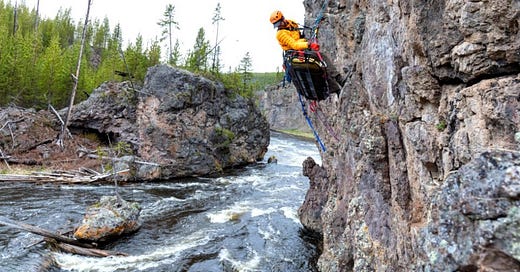You want to build a civilisation for the future, for your children and grandchildren. But how do you do that? It’s not like there are a lot of courses in civilisation building. Of course, there have been courses in “contemporary civilisation.” There was a two semester “core curriculum” required reading course at Columbia University when I was an undergrad there. I don’t know what remains of it, as the Marxist ideologues masquerading as “woke” and “tolerant” have been busy destroying civilisation, attacking humanity, hating Christianity, and thwarting all efforts at decency. But an understanding of past civilisations isn’t necessarily going to get us to a new, or revitalised civilisation in our lifetimes.
Search and rescue operations play an important and useful role in developing a culture of care, concern, decency, respect for property, and growth of community. Let’s talk about what search and rescue groups are, what they do, and how they help us reach the goals we have for our civilisations.
Search and rescue is a function of local communities. It may be funded through your city or county government. It may include independent non-profit groups, charities, volunteer fire departments, and your county sheriff. So we should revisit the previous discussion of your county in these pages.
Your County
You want to prepare for the future, you want to build a free civilisation, you want to protect your home and family. This article is about some things you can do, and will be in a series of articles on the same topic. For the purposes of political and cultural organisation, this post assumes that you are living in the United States. If you aren’t and w…
From the county discussion, recall that the highest law enforcement authority in your county is your county sheriff. In Hawai’i, Rhode Island, and a few other places, the county sheriff is appointed rather than elected. Alaska does not have counties (but has boroughs which are a similar organisational unit) and Connecticutt does not have sheriffs but state and judicial marshalls instead. For purposes of completeness, it should be noted that the District of Corruption and the territories of the United States (such as the US Virgin Islands) do not have sheriffs, either. But the expected value is that you live in a county, parish, township, or borough, and that there is a sheriff. There are over 3,000 sheriff departments in the United States.
Some states have given the function of search and rescue to the sheriff’s department. Other states have a hodge-podge of approaches to the function. But in most rural parts of the United States, fire departments are organised on a volunteer basis. So are search and rescue functions. Which leaves a large opportunity for independent professional organisations to develop and operate.
Who needs rescuing?
In some places, it may seem that there isn’t much call for search and rescue. If you live in an urban environment you may think that people aren’t getting lost. You would be mistaken. Children go missing all the time. Something like 8 million children a year were being stolen off the streets of the world back in 2019 and if that number isn’t accurately or widely reported today, that speaks volumes about who the hoax stream “journalism” community are and have become.
There is also a “criminal” search aspect to some search and rescue operations. The sheriff probably has authority to recruit and deputise a “posse” for the purpose of locating someone wanted by law enforcement. Depending on what they are wanted for, you may or may not be interested in participating in a given posse.
Then there are disasters. Every place is subject to some kinds of problem. Some places are earthquake prone, including places with volcanic eruptions. Other places are hit by hurricanes or super storms. Wildfires are another frequent problem in some areas. Tornadoes are common in many more places than you might guess, though there is certainly a “tornado alley” where they are very prevalent at certain times of year. Beyond natural disasters, we have train derailments, plane crashes, acts of war, acts of “terror,” and other man-made disasters. So, the answer to the question in the section heading, who needs rescuing, may be you.
Depending on the scale of the disaster or calamity, there may or may not be anyone coming to rescue you. You may need to effect self-rescue. You may need to be the one rescuing others in your community. If you want to be part of an anti-fragile, or even merely resilient community, you will need to know who is involved in search and rescue, what resources are available in this activity, and what you can do to help. Some disasters are more all-encompassing than others.
Resources
One of the reasons that I am not a flat Earther is I have been involved in actual space launch activities. I’ve also looked in detail at the trigonometry work done by Aristarchus and others in not only establishing the sphericity of the Earth, but in measuring its circumference. But, most of all, I believe that the contemporary popularity of the flat Earth mythology is a psychological warfare operation to deny the existence of the high ground. Which is not to say that nobody involved has closely held but deeply mistaken views about the shape of our world and the scale of our universe. But if you want to know where these ideas get funded, look no further than the people who want you enslaved.
Space resources can be very useful for anticipating disasters. Satellites track weather systems, including hurricanes and tornadoes. Satellites can be useful in detecting forest fires and prairie fires. Satellites are used for all kinds of land resource characterisation, including detecting foliage. And, yes, law enforcement can use satellite resources to identify “grow” operations of marijuana, coca, and other crops. All technologies that can be used for good may be used for evil. It’s the world we live in.
The vast majority of resources of interest, though, are of a more terrestrial and quotidian nature. For example, drones for aerial surveillance, helicopters for search and transport, all terrain vehicles, ambulances, and even defence tools are available as military surplus. Many search and rescue organisations can either apply to retrieve military surplus equipment and supplies or can work with their local county sheriff department to get what they need. This could be a methodology for quickly obtaining many useful tools for the search and rescue work.
I first became aware of these resources and opportunities back in 2010. At the time, various other obligations kept arising that distracted me from starting a search and rescue group. Now, there is more reason than ever for good people to build such groups for their local communities.
Decentralise and Thrive
I encourage you to form your own county and community groups and to build your own search and rescue group, or cooperate with existing groups in your area. What works where I am may not work where you are, but that’s okay. We don’t want one group, we want many.






You’re a fantastic writer!